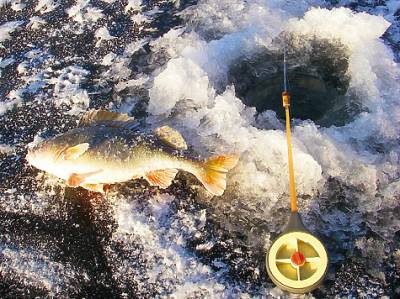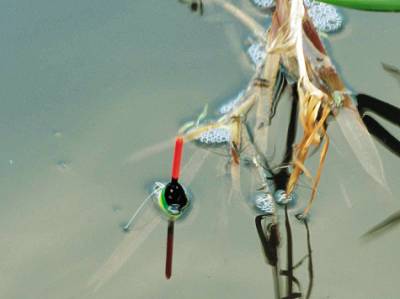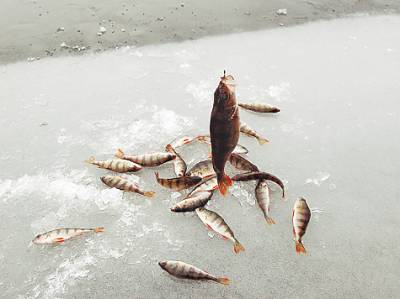
The past winter, like many previous, has a strong and prolonged thaws, when sometimes went all the snow and ice cover. For this reason, there were significant changes in all parameters of the external environment that somehow affect the behavior of all underwater creatures, even under the thick ice.
Noted that warming and the emergence of at least a small amount of melt water has a beneficial effect on fish biting in the difficult period of the so-called late winter you can which often extends to the whole spring period. However, in such an environment, it becomes possible to successful fishing in the quarries, some flowing ponds, river backwaters and shallow bays of reservoirs, where life at the end of the ice as if freezes. And yet the warming is not always a panacea for bad bite here, it turns out, much depends on the stage of warming, the rate of change of temperature and pressure, from the direction of movement of atmospheric fronts and even on the type of precipitation. In addition, and different fish reacts differently to emerging changes in the environment.
This is confirmed by several observations. So, if the warming is protracted, then the sharp change of all parameters of the atmosphere biting may even deteriorate. In addition, if atmospheric fronts coming from West to East, i.e. across magnetic field lines, the fish caught are usually mediocre. But when the transfer is changed to the North or South that is observed after passing the Central region of warm cyclone, nibble fish is significantly improved.
There is a dependence on the type of precipitation as winter and spring rain and snow carry different electrical charges out of the thick snow in the form of large flakes sometimes causes the fish almost biting and boring cold rain biting often worsens. As of the response of different fish to warming, then usually the activity increases in the white fish and dropping it predatory, which, however, does not apply to the pike and the burbot.
And yet this rule is not so strict, since the advent of melt water under the ice here in General improves habitat conditions, and therefore perch, and the perch and the ruff, and Bursch may also be activated, but only the fishermen do not find them at the usual places. Usually the change of external conditions causing the migration of predators following their food, so when dense clouds and low light Zander suddenly appears at relatively small depths, and large perch rises in polody or even under the ice.
Which begs the conclusion that upon the occurrence of a long thaw in spring, or the angler, first and foremost, we must abandon the memorized winter schemes finding and catching one or another fish, to avoid stationary fishing when next you drill two or three holes, lure them liberally, put them over the tent and, as they say, waiting for “the arrival”. Here we must assume that the warming with abundant flow of fresh water in reservoirs, everything is in motion. So the angler there is no reason to sit still — need to move, preferring the coastal zone and shallow areas. In such places most strongly beneficial effect of snowmelt water under the ice, and there may be clusters of very different fish, but really just rely on roach and perch, if you do not want them in addition to catch a little thing like a ruff, a gudgeon or bleak.
In protracted spring warming and approach to search roach or perch almost the same — these schooling fish tight “spots” collected on limited-area ‘ranks’ where an optimal habitat conditions. When hard feed competition they’re bold enough to take even large lures, so it makes no sense to linger on the trial holes, if there are no takes. Faster go search for the fish, if the wells do not fish, check with a portable echo-sounder, determining the presence of fish and the horizon on which it rests.
It should be understood that it is always warming, usually associated with the passage of a cyclone is a dynamic process, when the penetration of melt water under the ice continues continuously, changing the living conditions of fish in different parts of the reservoir. For example, a small amount of melt water somewhere only refreshes the “old” water that in the absence of abrupt changes of parameters of habitat and attracts a live feed, and a variety of fish. But when “new” water with a temperature of approximately zero degrees for a short time for the most part displace warm “old” water, the fish will most likely leave this place, avoiding thermal shock. Therefore, with the rapid development of events on the waterfront was not always the case that where the fish were eating well today, she will be taking tomorrow, and it will have to look again.
In this regard, one can speculate about the spring Kleve, who are often poor, when the waters starts to do the abundant melt water, and this process is strengthening day by day. Apparently, the melted ice water is so much that it fills and cools the entire space, causing a fish’s apathy, which, by the way, is practically not observed on the rivers, where the water environment is constantly cold due to mixing. Therefore, among the catches of winter on reservoirs in General is always more than even the richer fish large rivers. But in the end, finishing the thought, we can assume that until the fish is adapted to melt water ice on the ponds will have time to go or will be very dangerous.
In the case when an active fish is found, you need to act as quickly as possible because the bite can last all day, and only an hour. It’s more suited applying tackle with a jig, the optimum size with the usual bait on the hook that allows you to fish different water levels, unlike winter float fishing rods. In addition, complementary feeding under fishing with a float for admission to the reservoir of melt water often affects the biting different white fish negatively.
In the case of good fishing it is better to switch to bezmetallny catch, because it often catches bigger fish. For example, in some ponds at strong thaws carp and carp almost do not react to bloodworms, but systematically caught in the “devil” even when it is a high transaction — bite these fish occur near the bottom and under the ice. Naturally, perch and roach are characterised by their mobility, therefore, for successful fishing need as a single “devil” on the line, and the “steam” of those baits that are posted on line at the distance of one meter.








